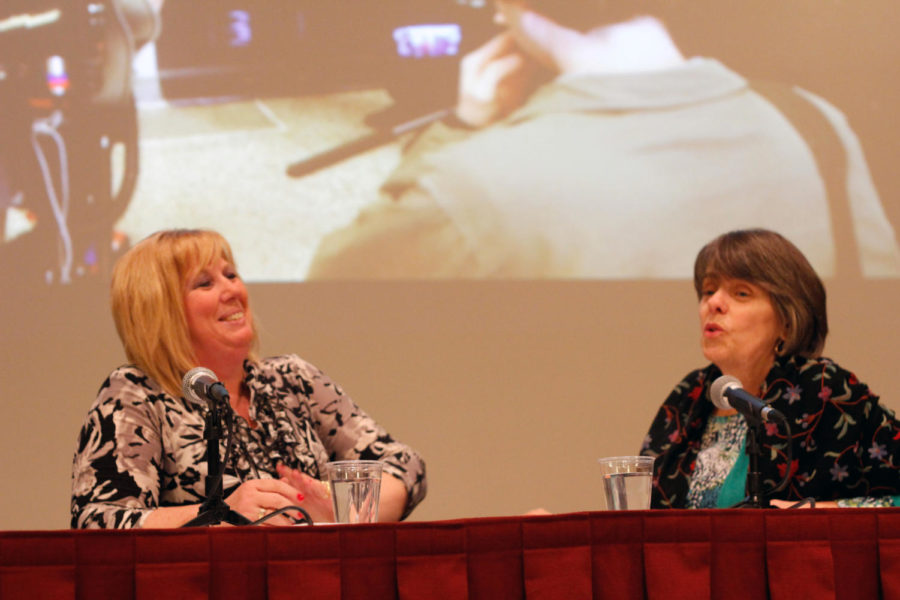Tinker, Kuhlmeier Frey encourage First Amendment understanding
April 18, 2014
Mary Beth Tinker and Cathy Kuhlmeier Frey, plaintiffs in two of the biggest Supreme Court cases regarding student speech, spoke to almost 400 people about their cases and talked with the audience about the First Amendment. This discussion was a part of Iowa State’s First Amendment Day.
“The First Amendment isn’t getting the attention that it should,” Tinker said. “It’s really the basis of our democracy.”
The first half of the discussion focused on Tinker and Kuhlmeier Frey telling their stories about the events that led up to their Supreme Court cases.
Tinker wore a black armband to school along with her older brother, John, and other children in the Des Moines area to protest the Vietnam War and support President Kennedy’s proposed Christmas Truce after watching news reports about the conflict in 1965.
“We just thought we were standing up for peace at Christmas time,” Tinker said.
Eventually, Tinker, her brother and others who chose to wear the armbands on that day were suspended from school. The American Civil Liberties Union heard about the suspensions and helped Tinker file a lawsuit against her school district which eventually reached the Supreme Court.
“The Supreme Court ruled, by seven to two, that we won our case,” Tinker said. “Not only did we win our case but students all over the country won because the court ruled that neither students nor teachers leave their constitutional right to freedom of expression at the schoolhouse gate.”
Following the Supreme Court’s decision, the court created the Tinker Standard which states that all speech in schools is protected except speech that invades the rights of others and any speech that creates a disruption of normal school activities.
Kuhlmeier Frey worked for her school’s newspaper at Hazelwood East High School in St. Louis County, Mo., when her principal decided to cut out stories she had been working on about teen pregnancy, the effects of divorce on teenagers and runaway children.
“The story topics we did mattered because they were relevant problems,” Kuhlmeier Frey said. She said that her principal told them the stories were too mature for an immature audience.
The American Civil Liberties Union also heard about Kuhlmeier Frey and helped her and three other students file a lawsuit against their school district which also went to the Supreme Court. This time, the Supreme Court ruled that anything sponsored by the school could be subject to censorship.
“When we lost, the Tinker Standard no longer applied and it gave the school a lot more freedoms,” Kuhlmeier Frey said. “I feel very unfortunate for the students today that things are so much harder.”
Mike Hiestand, a special project attorney for the Student Press Law Center, later discussed the Morse v. Frederick case that he said has further eroded students’ free speech rights.
Joseph Frederick was suspended from school after he displayed a “BONG HiTS [sic] 4 JESUS” banner across the street from his school during the 2002 Olympic Torch relay. The Supreme Court heard Frederick’s case and added to the Tinker Standard that any speech encouraging illegal drug use can be censored by schools.
“The laws change because they’re laws made by people and the people in the [Supreme] Court change,” said Hiestand.
Tinker and Kuhlmeier Frey travel all over the country and talk to students to not only advocate for the First Amendment but to also encourage them to stand up for what they believe is right.
“Students need to know their rights because without knowing your rights, you can’t stand up for your rights [and] you can’t use your rights,” Tinker said. “We have so many decisions to make in our world and our country that we need student’s input [on].”
“If you’re constantly told no and you take that for granted and you back down to everything, where are we going?” Kuhlmeier Frey said. “What is our society going to become if no one is willing to challenge things?”
“It’s always been young people that have pushed us forward; that’s what they’re known for,” Hiestand said. “They actually have free speech tools [like smartphones and social media] that are unprecedented. We can’t keep doing things the way we’re doing it and if history is any reminder to us, it has to be the young people that really push us forward.”

















